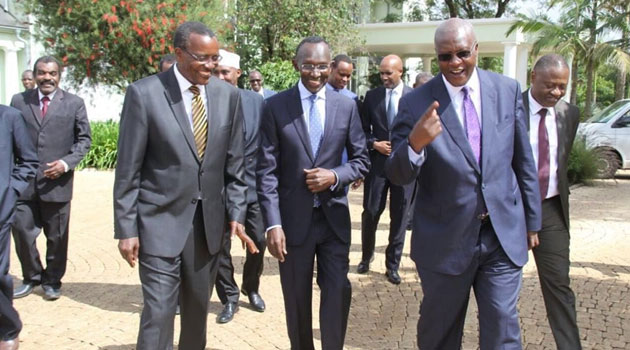
The top justices included Kenya’s David Maraga, Uganda’s Bart Katureebe, Tanzania’s Ibrahim Hamis Juma, and South Sudan’s Chan Reec Madut/CFM NEWS
NAIROBI, Kenya, May 14 – Chief Justices drawn from the East African Community (EAC) members States have challenged respective governments to increase resource allocation for respective Judiciaries in order to enhance delivery of justice.
The top justices, who included Kenya’s David Maraga, Uganda’s Bart Katureebe, Tanzania’s Ibrahim Hamis Juma, and South Sudan’s Chan Reec Madut, noted that current allocations remained below the globally recommended threshold of 2.5 per cent of the national budget.
“While we recognise and appreciate that financial resources of our countries are limited, the current financial allocations are less than the needs of the Judiciaries to deliver quality and effective services to the citizenry,” the Chief Justices pointed out in a joint communiqué read by Uganda’s Katureebe following a three-day East African Community Chief Justices Forum (EACJF) in Nairobi.
The top judges called for the operationalization of a Judiciary Fund to ensure the financial autonomy of the judiciary something they termed as key in promoting the independence of judiciaries in the region.
The Chief Justices also agreed to form a joint database to facilitate sharing of information for purposes of enriching jurisprudence that would ultimately ensure the provision of legal solutions to controversies arising from regional integration.
“We resolve to enhance the collaboration amongst Chief Justices and the Judiciaries of East Africa, share judicial experiences, expertise, and jurisprudence,” the Chief Justices who were also joined by the President of the East African Court of Justice (EACJ) Emmanuel Ugirashebuja, Chief Justice of Zanzibar Omar Othman Makungu and Somali’s Ibrahim Eidle Suleiman who attended as an observer, resolved.
To further strengthen jurisprudence in EAC, they promised to collaborate with EAC organs to strengthen judicial independence and expand inter-branch interdependence in the region in addition to the inclusion of discussion on EAC and EACJ in their respective national judicial colloquia.
The Chief Justices also acknowledged the challenges presented by case backlog and lack of accountability which continued to negatively impact the delivery of justice in the region.
They committed to upscale initiatives to clear case backlog in all the Judiciaries in the region by spearheading the adoption of technology, institutionalization of performance management, and strengthening integrity mechanisms.
In Kenya for instance, CJ Maraga is banking on the ongoing implementation of digitization and automation to ease case backlog with 66,214 cases that have been pending in court for between 5 and 10 years set to be concluded by the end of the year.
The number of incomplete cases as at the end of 2017 stood at 533,350.
Already, selected courts are piloting electronic filing systems, online assessment of court fees and the rollout of speech to text software which will facilitate automatic transcription of proceedings.
The Judiciary also targets 100 per cent transition to mobile money payment systems with 80 per cent of court stations reported to be using mobile money according to the State the Judiciary and the Administration of Justice Report (SOJAR) 2016-2017 released in December last year by CJ Maraga.
The rollout of the Judiciary Financial Management Information System (JFMIS) is also underway with the ultimate goal of enhancing accountability and transparency.
“The implementation of a far-reaching digital strategy that will not only transform the way our courts work but also how the public interacts with us,” Maraga pointed out at the time the report was being released.
“This will not only speed the hearing of cases but will also help us maintain the integrity of court records,” he added.
The Kenyan Judiciary has also been rolling out an ambitious court expansion project that is geared towards face-lifting existing court infrastructure and establishing a High Court in each of the 47 counties. So far, only 39 counties are covered.
Frequent adjournments have however been cited in the recent past as a major contributor to the accumulation of backlog with Deputy Chief Justice Philomena Mwilu recently asking judges to be firm and avoid issuing unnecessary adjournments.
“Although Kenyans file more cases than what we’re able to deal with every day, if we put our feet down – because we have the power to do so – and require of counsel to proceed with their cases, we would to a very great extent reduce the number of what I consider myself to be totally unnecessary adjournments,” she said on April 12 during the opening session of a two-day National Alternative Dispute Resolution Stakeholders’ Forum jointly convened by the Alternative Dispute Resolution (ADR) Taskforce and Nairobi Centre for International Arbitration (NCIA).
































